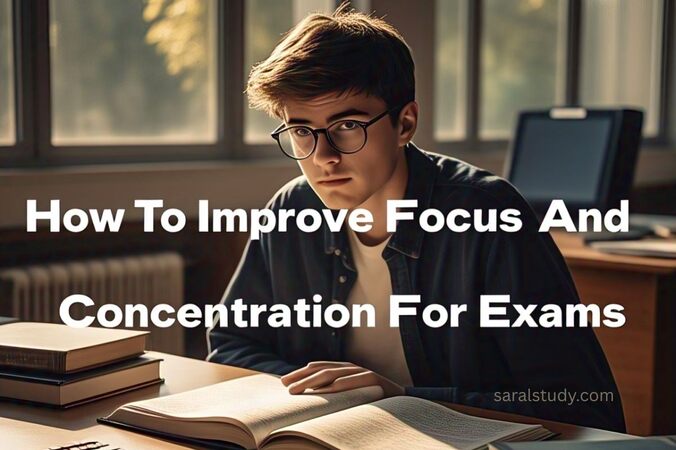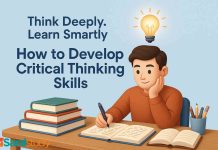One fine day, you sat down to study. You had all the required study materials, that is, books and stationary. The exams are on the horizon, but you still can’t start studying. You feel stuck and unmotivated. You dread the courage to focus on the study material for 5 minutes, and even if you started, you cease to sustain your attention for long.
Isn’t it frustrating that our focus and concentration are at their lowest when most required?
Let’s understand what makes it difficult for us to focus and concentrate.
But first and foremost, what is the difference between focus and concentration?
Difference Between Focus and Concentration
Focus is the ability to select what to work on. Concentration is the ability to maintain attention and avoid distraction. Hence, you should know what to work on before indulging in the activity and sustaining your attention. You can’t concentrate if you can’t focus, and therefore, they go hand in hand.
For instance, you know you shouldn’t be on your social media scrolling when you have your exam tomorrow. Choosing to put away your phone and sitting to study the material is focusing and making yourself study for 1 hour; redirecting your mind when it wanders is concentration.
Now the question arises, how to increase your focus and concentration, especially for your exams.
Techniques to improve focus and concentration
According to a study supported by the National Science Foundation, our brain is wired in a way that connects physical movement with internal body functions. This means that when we move, it’s not just our muscles working—our brain is also influencing things like breathing, digestion, and even our ability to focus. This shows how closely our mind and body are connected when it comes to staying alert and concentrated. (Source: National Science Foundation, 2023)
The techniques to improve focus and concentration could be broadly classified into two types: physiological and psychological. Physiological techniques consist of how changes in your body improve your concentration and focus, whereas in psychological techniques, we would be focusing on how changes in mental activities and the mind can positively influence your focus and concentration.
A. Physiological Techniques
1. Adequate Sleep
It can’t be emphasised enough how sleep directly affects one’s cognitive functioning. Studies have shown sleep deprivation reduces decision making, problem solving and our ability to concentrate. Also, adequate sleep is essential for consolidating new information and experiences. Hindrance in sleep quality could make it difficult to learning and retain new material.
You may ask, what duration of sleep is adequate? Researchers advise maintaining a moderate sleep duration of around 7-9 hours per night.
2. Diet and Hydration
It remains no doubt that diet and hydration play as much significant role as sleep quality.
Various studies have shown that nutrient-rich food not only keeps you healthy but improves cognitivie performance. A nutrient rich diet consists of omega-3 fatty acids, vitamins, minerals and antioxoidants. These are essential for brain health and also help improve memory, focus and mood.
On the contrary, eating food high in sugar and fats negatively affects attention and memory.
Now you know, avoid food high in sugar and fats and increase the intake of vegetables, nuts and fruits.
Ever heard about the fact that your brain is about 70% Water?
It’s true and scientifically proven. Water supports brain cell communication, delivers nutrients to the brain, removes toxins and regulates brain temperature.
According to the research in the Journal Nutrients (2019), it was found that dehydration impacts attention, short-term memory, psychomotor skills and mood and alertness.
Therefore, always stay hydrated by drinking an adequate amount of water and also eating water-rich foods like cucumber, watermelon and oranges.
3. Circadian Rhythms
Circadian Rhythms are our internal 24-hour biological clock, which also signals the brain about the time to sleep and time to wake. Disruption to these Rhythms can significantly impair mental processes such as focus, attention and memory.
If you are a person who struggles to be productive in the morning but is productive at night, then you might be a “night person”, and if it’s the opposite, then you might be a “morning person”.
This chronotypical time frame is when your performance peaks; hence, it is very important to be identified.
Your circadian rhythm is also facilitated by light exposure. Exposure to natural light during the day and minimising artificial light at night can help regulate your circadian clock, improving alertness and concentration.
Tip: Make sure your room is well-lit when studying.
B. Psychological Techniques
1. Mindfulness
I’m pretty sure you might have heard hundreds of times that meditation is very helpful in concentration. But, alas, the concept of meditation and mindfulness is not accepted profoundly; it sounds unreal, leading people to not even give it a chance.
Mindfulness is a practice of grounding yourself in the present, eliminating distractions and focusing on what really matters.
Mindfulness exhilarates focus and concentration as it lowers stress levels and reduces anxiety, helping the brain to focus more effectively under pressure.
Some of the mindfulness exercises are as follows:-
I. Meditation
- In breathing awareness exercise, you focus on the natural rhythm of your breath.
- And when your mind wanders, you gently guide it to the breath without judgment.
- If you find it difficult to follow through, you could take help from the guided meditation widely available on the internet.
II. Body Scan
It is similar to meditation, the difference being you mentally scan your body from head to toe, noticing any areas of tension, discomfort, or sensation.
This exercise promotes physical relaxation and increases awareness of how emotions are stored in the body.
III. Mindful Walk
In this exercise, you walk slowly and deliberately, paying close attention to the feeling of your feet touching the ground, your balance, and your surroundings. It grounds you in the present and brings a motivation calm to everyday movement.
IV. 5-4-3-2-1 Grounding Technique
This technique is very effective when you feel distracted. In this technique, you name 5 things you see, 4 you can touch, 3 you can hear, 2 you can smell and 1 you can taste from your surroundings at the moment.
This technique calms racing thoughts by grounding or anchoring your awareness to your physical senses.
2. Time Management
Almost everyone feels stressed and overwhelmed in terms of the amount of material to study for the exam. Not only does it hinder our focus, but it leads to procrastination as well. This can be attributed to poor time management.
Effective time management can reduce cognitive load, minimize anxiety, improve goal completion and improve our ability to resist distractions.
Tools you can use for effective time management are important to leverage its benefits. They are as follows:-
I. Pomodoro Technique
Break your work with 25-minute focused sessions followed by a 5-minute break. Over time, you could increase the duration to 50-minute focused sessions followed by 10-minute breaks.
But remember, these sessions should be distraction-free.
II. To-Do list
Create a to-do list to decrease your cognitive load of deciding what to do and also help save time.
To-do lists can be made on paper and pen or apps like Notion or Notes app on your phone.
III. Eisenhower Matrix
The Eisenhower Matrix is a table-like structure consisting of 4 compartments where you can prioritise tasks based on urgency and importance. It significantly increases your productivity and decision-making capability.
3. Goal setting
Goal setting is essential as we learned earlier for focus. Knowing what to do and setting goals is what makes it easiest.
One of the most effective and advised methods of goal setting is setting SMART goals, where every letter has a meaning.
- S- Specific– Be clear and precise about what you wan to achieve
- M- Measurable- Define how you’ve tracked progress or success
- A- Achievable- Make sure the goal is realistic based on current resources and constraints.
- R-Relevant- Ensure it aligns with your overall values or long-term objectivity
- T- Time bound- Set a clear deadline or timeline to stay accountable.
For example, setting a goal of “I’ll study more” is vague. Instead a SMART goal would be- “I will study history for 2 hours every weekday at 5 p.m. for the next few weeks to prepare for my Board Exam.”
SMART goals help sharpen your focus, reduce procrastination and give your brain a clear target, which naturally boosts motivation and concentration.
4. Eliminate distraction
It’s basic, you’ll only be able to focus and concentrate if you are not distracted.
Distractions could be your environment or a digital device like a mobile phone or TV. Your study desk should also be free of clutter for a better study environment.
Distractions are not only physical; mental distractions could also hinder your concentration and productivity.
TIP- Keep a notebook or diary, and note down every irrelevant thought or task which comes in your mind to be addressed later.
Also Read: Digital detox: Why and How to Take a Break from screens
C. Bonus Techniques
1. Focus music
Sometimes, the voices in our head are so prominent that they make it difficult for us to focus. An effective tool could be to use focus music known as white noise, brown noise or pink noise.
It’s better than the instrumental or lo-fi music we hear while studying.
My personal favourite is brown noise, its shuts all the thought and noises in the head, making it easier to concentrate.
2. Effective breaks between study sessions
As much as breaks are important between study sessions, make sure these breaks are effective.
Effective breaks could be a quick 5-minute walk in the neighbourhood or park, reading a book, indulging in a healthy snack, or even talking to a friend on a call.
But on the other hand, if you indulge in scrolling through social media, you’ll bind yourself in a dopamine trap leading to poor focus and concentration in the next study sessions.
Conclusion
In conclusion, enhancing focus and concentration, particularly when studying for exams, is a holistic process that engages the body and the mind. Recognizing the distinction between focus—selecting what to work on—and concentration—maintaining attention—enables us to address distractions better. Physiological conditions such as getting enough sleep, a balanced diet, staying hydrated, and honoring your natural circadian rhythms form the basis of mental clarity and alertness. Just as valuable are psychological techniques like mindfulness, meditation, and grounding, which assist in keeping your focus grounded and minimizing anxiety.
Time management techniques such as the Pomodoro Technique, to-do lists, and the Eisenhower Matrix can divide daunting tasks into manageable steps, minimizing procrastination and maximizing productivity. Having SMART goals provides direction and purpose to your efforts, making it simpler to remain motivated. Removing distractions—both physical and mental—by establishing a distraction-free environment and delegating intrusive thoughts can further improve your capacity to focus.
Lastly, effective breaks and focus music can rejuvenate your mind and aid in sustained attention. Through integrating these psychological and physiological methods, you can enhance your concentration and focus immensely, not only for exams, but for any situation that needs your optimum effort.
Also Read: Semester Exams: Ways To Prepare Them





